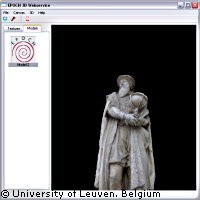Europe's cultural heritage under 3D construction
The creation of a European digital library has begun at the University of Leuven in Belgium, where a group of doctoral students is using a dome scanner to produce digital images that can be used remotely by researchers. The university is working through the EU-funded EPOCH network to develop new technology for the preservation of ancient and decaying texts and artefacts while at the same time opening them up for research. The Excellence in Processing Open Cultural Heritage (EPOCH) network comprises around 100 European cultural institutions collaborating to improve the quality and effectiveness of information technology (IT) in preserving cultural heritage. Currently, the Leuven team is working on a digital image of a cuneiform tablet from the 4th millennium BC, comprised of up to 260 pictures, for manipulation as a virtual image by researchers across the world. The team has developed tools which allow users to upload digital images to servers where software performs a 3D reconstruction of the scene and reports the results back to the user who requested the information. According to Professor Luc Van Gool, the technologies his team has developed will make it easier and cheaper for researchers to make high-quality, realistic 3D models of all types of archaeological artefacts. In January, his research team will travel to one of the largest ancient Maya cities in Mexico, Calakmul, to start trials of all these technologies. The project is linked to a large-scale digitisation programme conducted by the National Library of the Netherlands in The Hague. Already books, manuscripts, photographs and letters can be accessed through the library's website, which has now begun to digitise its whole collection of 30 million items. The library claims to own an 8 million-page newspaper collection dating back to 1618. The Leuven project uses specialised equipment developed by the Vienna company Quidenus Technologies, which has created a robotic book scanner capable of digitising up to 2,000 pages an hour. The company said that 50 engineers and technicians were involved in the creation of the machine, which automatically turns all the book pages regardless of paper quality, thickness and weight. Leuven University has also joined forces with the Dutch historian Ewoud Sanders, who has developed a database of 1.5 million pages using a high speed scanner. According to Dr Sanders, digitising books, manuscripts and other artefacts does not spell their end. On the contrary, it gives them a 'second life'.
Countries
Belgium



